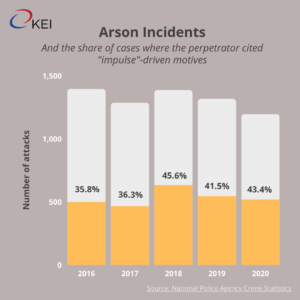The Peninsula
Obstacles to Reversing the Rise in Anger-related Crimes

A recent arson attack on a lawyer’s office revived concerns that violent crimes motivated by anger are on the rise in South Korea. The national police reported that around 40% of domestic arson attacks over the past decade have been “impulsive” and that this share has been steadily increasing over the years. While there is growing recognition that reversing this trend might require the government to address its underlying social causes, the absence of a clear definition of what constitutes an “anger-related crime” prevents the formulation of such policy responses.

Observers note that a large number of perpetrators of these anger-related crimes have experienced economic or social setbacks in the country’s highly competitive environment, such as long-term unemployment. Many perpetrators also suffer from untreated mental illnesses, which experts attributed to the stigma against psychiatric treatment in South Korea. These commonalities among perpetrators suggest that the rise in anger-related crimes can be seen as a social and cultural phenomenon. Many experts have also come to a general consensus that this problem demands nation-level policy solutions that takes into account structural factors.
However, the causes of anger-related crimes are diverse and the absence of an academic and societal consensus on the exact definition of an anger-related crime may limit the government’s capacity to identify their social origins. Motiveless crimes, random crimes, and hate crimes are all names conflated in the media. Academics underline how such concepts are too vague to reveal specific characteristics of the act and diverts focus away from conceiving a concrete policy response.
This briefing comes from Korea View, a weekly newsletter published by the Korea Economic Institute. Korea View aims to cover developments that reveal trends on the Korean Peninsula but receive little attention in the United States. If you would like to sign up, please find the online form here.
Korea View was edited by Yong Kwon with the help of Jae Chang, Kaitlyn King, Yu Na Choi, and Mai Anna Pressley. Picture from the flickr account of Rodrigo Filgueira
